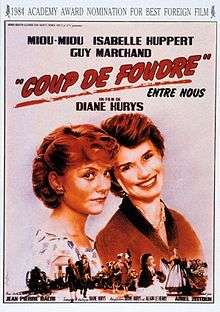Entre Nous (film)
| Entre Nous | |
|---|---|
 French film poster for Entre Nous | |
| Directed by | Diane Kurys |
| Produced by | Ariel Zeitoun |
| Written by |
Olivier Cohen (book) Diane Kurys (book) Alain Le Henry |
| Starring |
Miou-Miou Isabelle Huppert Guy Marchand |
| Music by | Luis Enríquez Bacalov |
| Cinematography | Bernard Lutic |
| Edited by | Joële Van Effenterre |
| Distributed by | Gaumont |
Release dates |
|
Running time | 110 minutes |
| Country | France |
| Language | French |
Entre Nous ("Between Us"; also known as Coup de foudre) is a 1983 French biographical drama film directed by Diane Kurys, who shares the writing credits with Olivier Cohen. Set in the France of the mid twentieth century, the film stars Isabelle Huppert, Miou-Miou, Guy Marchand, Jean-Pierre Bacri, Christine Pascal, Denis Lavant and Dominique Lavanant. Coup de Foudre means "love at first sight".
Plot
Entre Nous tells the story of two young married women in the 1950s who don't recognise how unfulfilled they have been in their marriages until they meet each other. In the preliminary scenes, set in 1942, Lena (Isabelle Huppert), a pretty 18-year-old, has been arrested and brought to an internment camp for Jews in the Pyrenees. The camp is guarded by members of the French Foreign Legion, and one of them, Michel (Guy Marchand), writes her a note warning her she may be deported to a German Nazi camp, and offers her marriage as a means of escape. She accepts. During the marriage ceremony she discovers that he too is Jewish; she's dismayed to learn that she won't have the protection of a gentile name.
But she has no choice and they hasten to the Italian border. By 1952, the hardworking Michel has got himself his own garage in Lyon, and they have two small daughters. Lena meets Madeleine (Miou-Miou), at a school pageant. Madeleine, who comes from a moderately wealthy family, was an art student in 1942, and had married a fellow student who was killed in a street skirmish between the students and the collaborationist police. A widow at 19, Madeleine drifted into marriage with an actor/black marketeer, Costa (Jean-Pierre Bacri), and now has a son at the school. The two women become inseparable, in one scene, sharing a bed (though there is no overt lesbian sexuality between the characters).
They develop an intimacy that is based partly on their boredom with their domestic situations. Michel and Lena's marriage is fractious, although there are moments of happiness with their two young daughters, and the film is primarily about Lena leaving her husband. At the end of the film, she and Madeleine (who left her own husband sometime earlier, had trouble holding down a job, and went through a nervous breakdown), are about to open a dress shop in Paris.[1]
Awards and nominations
Won
- San Sebastián Film Festival
- FIPRESCI Prize (Diane Kurys)
Nominated
- Academy Awards
- Best Foreign Language Film[2]
- César Awards
- Best Actor – Supporting Role (Guy Marchand)
- Best Actress – Leading Role (Miou-Miou)
- Best Film
- Best Screenplay – Original (Diane Kurys and Alain Le Henry)
See also
- Isabelle Huppert filmography
- List of submissions to the 56th Academy Awards for Best Foreign Language Film
- List of French submissions for the Academy Award for Best Foreign Language Film
References
- ↑ Pauline Kael State of the Art ISBN 0-7145-2869-2. This synopsis derives from p.133-135
- ↑ "The 56th Academy Awards (1984) Nominees and Winners". oscars.org. Retrieved 2013-10-27.